
CiTIUS achieves excellence
CiTIUS celebrates the result of the recent evaluation of research centres of the Galician University System (SUG), in which the external Scientific Commission of the Xunta de Galicia, formed by experts of the highest prestige in the field, has punctuated the exceptional progression of the centre in recent years with the highest grade: an ‘A’.
Two university-industry chairs (AI in Personalised Precision Medicine and Microelectronic Design); two awards to the centre for its impact and social relevance (SERenidade Award, Cadena SER, and Special CPEIG Award, Galician Association of Computer Engineers); and the responsibility and privilege of organising the most important scientific meeting in Europe in the field of Artificial Intelligence (ECAI 2024), are just some of the most recent successes of CiTIUS (Singular Centre for Research in Intelligent Technologies of the USC).
A new and exceptionally important one now joins them: having achieved the highest possible qualification after the recent quality assessment of the centre, carried out by a commission of experts appointed by the Xunta de Galicia as part of its policy of singular research centres of the Galician University System. "In other words, it's like getting an 'A’, says Senén Barro, scientific director of CiTIUS. The head of the centre stresses that "this is extremely important, given the rigour with which we are evaluated and its impact on the centre's funding", he explains.
With this result, CiTIUS is among the elite of research centres, together with three other centres: IGFAE, CiQUS and CiMUS (all of them from the University of Santiago de Compostela, the only Galician university that has achieved an ‘A’ for its research centres), among the ten research centres that have been accredited in this new call of the autonomous government.
A benchmark of excellence
The result of the evaluation has been received with great satisfaction at the centre, which has celebrated "with pride" this new recognition of the work carried out by the entire team in the last three-year period. As Senén Barro acknowledges, "being part of the network of singular research centres of the Galician University System is a great responsibility and individual and collective satisfaction, but having achieved excellence within this network amplifies everything". Barro also sees this new qualification as a stimulus to continue growing: "we are sure that it not only reinforces our role as a reference in Artificial Intelligence research in Galicia, but also revalues us within the Spanish and European research system", he says.
For her part, the deputy director of CiTIUS , Paula López, wanted to value "the trajectory of CiTIUS, which joins the only three other centres qualified as “A” after the evaluation process, all of them from the USC".
"Outstanding performance"
The external evaluation of CiTIUS states that the centre "has demonstrated an outstanding performance" in its activity and also points out that the centre "not only stands out for its solidity and balance between vision and execution, but also for its organisational structure and quality standards, which place it at the forefront in its field".
More specifically, the evaluation team refers to the centre's own organisation, pointing out that "in terms of organisation and governance, CiTIUS is characterised by a strategy directed towards Intelligent Technologies, prioritising excellence and quality over quantity. This, together with a structure that promotes effective talent management and agile decisions, configures CiTIUS as a well-organised centre, with a clear focus on high quality standards".
With regard to the research quality dimension, the report's authors highlight "its high-impact scientific contributions" and the centre's ability to "attract relevant research projects". They also focus on the social relevance of CiTIUS, valuing very positively "its relationship and efforts with the AI degree, the results of which show enormous potential as a lever for change in this context". In this sense, the report also highlights "the implementation of solid ethical policies in Artificial Intelligence, and the expansion of the centre's social and communicative impact at a global level", encouraging it to continue working along the same lines.
The evaluation report concludes that it is relevant to highlight that ‘CiTIUS is a centre whose growth is highly anticipated and desired’. The Scientific Commission concludes its report convinced that this ambition "will help to further strengthen its capabilities in research, knowledge transfer, and its global positioning, thus establishing a solid framework for the expansion of its scientific influence in the field of Artificial Intelligence".